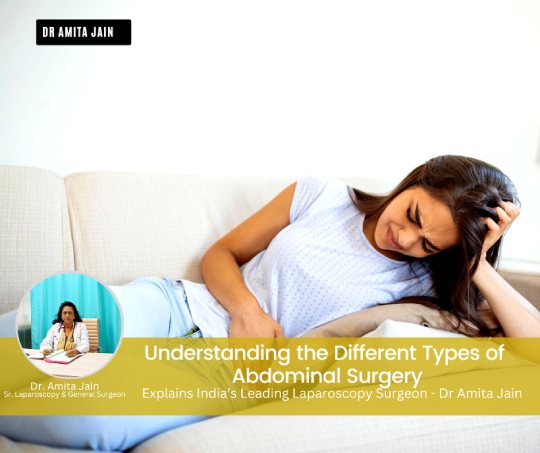You may be aware that several people require some sort of surgery for their abdomen. This blog by India’s top laparoscopic surgeon Dr Amita Jain shares the types of abdominal surgeries and things to expect from abdominal surgery.
Segmental colectomies
Usually, a vertical incision is created in the middle of the abdomen, overlying the part of the bowel with the disease. The segment of the bowel having the disease is removed. If the excision is for cancer, an attempt is made to remove a broader segment to include lymph nodes. The ends of the bowel are joined together (anastomosis) to be water-tight and allow healing.
Small bowel resection
This surgery is carried out to remove Crohn’s disease, cancer, ulcers, benign tumours, and polyps. It removes a portion of the small intestine. The surgeon will remove the diseased portions of the small intestine and sew the healthy parts back together. If needed, an opening to the outside of the body called an ostomy is made.
Repair of parastomal hernias
The most common issue with having an ostomy is a hernia. An ostomy is an abdominal wall opening, formed to bring the bowel to the skin surface. Space next to the bowel in the abdominal wall allows fat or another loop of the bowel to slip into the space.
The hernia repair is done by closing the space with sutures or mesh; occasionally the ostomy is moved to another site on the abdominal wall.
Ostomy creation and revisions
An ostomy is a surgically done opening linking the bowel to the surface of the body. Ostomy revisions are surgeries to correct defects, like protrusion, recession, or hernia of the ostomy. This surgery is to make the ostomy protrude a small length so that it will accept an appliance more comfortably.
Low anterior resection
In this surgery, part of the rectum is removed, but it is rejoined (anastomosed). Entailed in this operation is dissection deep into the pelvis. Anastomoses at this deep level are at enhanced risk to leak, so mostly, an ostomy is made above to stop the pressure of bowel movements.
Another risk inside the deep pelvic dissection is an injury to nerves that serve the bladder and reproductive organs, which might cause later dysfunction.
Repair of rectal prolapse
Treating rectal prolapse mostly requires surgery. This allows pulling the rectum back to its normal position and affixing it there.
Things to expect from abdominal surgery
- Your doctor will provide you with bowel preparations for the day before your surgery. These usually include taking a laxative and not eating or drinking past midnight.
- The majority of abdominal surgeries last between several hours.
- You shall expect to stay at the hospital for 7 days, more or less than 3 days.
- The recovery time is different for each individual, but several patients return to their usual routines in a 1 to 3-month period.
- A pain management regimen will be prescribed.
- If your surgery includes an ostomy, you will be informed how to care for it. Home care will be arranged.

Dr Amita Jain is a surgeon with highest degree of professional competence, precision and surgical craftsmanship. Performed all complicated general surgery procedures with in depth knowledge of invasive and few minimal invasive and onco surgical techniques. Underwent special training in trauma, executed various trauma-related complex life-saving neurosurgical procedures, reconstructed injured mangled limbs and performed vascular and reconstructive procedures with critical care.
Dr Amita Jain holds 28 plus years of rich experience in Trauma and General Laparoscopic Surgeries (including Gallbladder stone removal, appendix removal, hernia repair surgery, piles and fissure surgeries). She was the Professor Surgery of at the Army College of Medical Sciences and Base Hospital Delhi Cantt. In 1994 she was commissioned as Surgeon under the United Nations Mission in Congo. From 2020 to 2022, she worked with Bansals Hospital. Currently, Dr Amita Jain is the Senior Consultant, (Speciality: General and Laparoscopic Surgeon) at Artemis Lite Hospital, New Delhi


